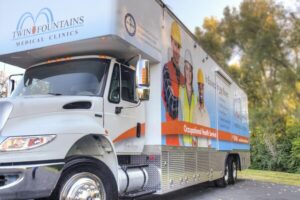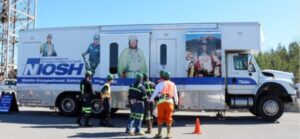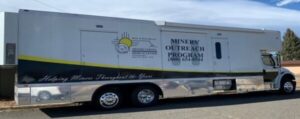“Industrial athletes” are workers in physically demanding jobs who, like sports athletes, require endurance, strength, and must manage the physical demands of their work. People who work in fields from construction to manufacturing, mining to healthcare, commercial vehicle drivers to furniture movers, perform strenuous tasks and face a higher risk of injuries. And like football, baseball, or basketball players, and most other athletes, they require proactive approaches to incident prevention and wellness.
Mobile health clinics (MHCs) provide a comprehensive approach to employee health and safety. These highly cost-effective mobile clinics can travel

directly to the worksite, staffed with doctors, nurses, physical and occupational therapists, and
even athletic trainers with expertise in musculoskeletal injuries and injury prevention.
Mobile clinics are used to perform occupational health fitness tests, also known as fitness-for-work assessments or fit-for-duty exams. These medical evaluations assess an employee’s ability to perform their specific job duties safely and effectively and can include mental wellness and fatigue tips. A logger may require assessment for physical strength, while the evaluation of an underground mine worker may consist of their aptitude to maintain emotional stability when working long hours in confined spaces.
The goal is to improve employee health and safety, ensure workplace compliance, and streamline the process for both employers and employees. Health assessments and tests onboard mobile clinics may include:
Employers and all management personnel must understand the physical and emotional demands of the jobs they supervise so they can implement programs to reduce injury risks, improve worker health, and enhance productivity.
Education in occupational health for employers focuses on equipping their employees with the knowledge and skills to identify and avoid workplace hazards and promote a safe and healthy work environment. This involves providing training on safety procedures, hazard recognition, and emergency response.
Mobile medical clinics enhance occupational health readiness for employers by bringing healthcare services directly to the workplace, improving access, and reducing costs. This allows for on-site training, screenings, and consultations for the employer and employee, eliminating the expense of taking time off work to travel to a medical facility. They also serve to make occupational health information more understandable and readily available for employees.
Beyond general health and education mobile health clinics can provide costly, specialized screening instruments right to your door. Here are just a few examples:

For those working in the mining industry, certain construction sites, chemical plants, or anywhere there is a concern of lung damage, X-ray tests should be performed, and NIOSH- approved B Readers should classify chest radiographs. NIOSH-approved B Readers are physicians certified by the National Institute for Occupational Safety and Health (NIOSH) to interpret chest X-rays for signs of pneumoconiosis (lung diseases caused by dust exposure).
Vision issues are one of the top causes of workplace accidents. Studies suggest that employees with vision problems are three times more likely to be involved in a workplace accident. That’s why vision testing is essential to occupational health screenings, as it examines:
Employee vision health is crucial for ensuring a safe work environment.
Mobile unit-mounted audiology booths are unique to select mobile health clinic manufacturers because they require specialized acoustic engineering and design to provide a quiet, accurate environment for hearing tests in a mobile setting. The specific needs of audiology, including precise sound isolation and vibration control, often necessitate a more customized approach. Properly constructed and mounted mobile audiology rooms are ideal for employee examinations where permanent facilities are inaccessible.

Occupational health hearing exams typically start with audiometric screening, also known as an audiometer hearing test. This basic test checks whether someone can hear at normal levels and is usually measured as a simple pass/fail—either the person hears well enough, or further testing is needed.
Audiological testing is then used for a more in-depth assessment. This type of test goes beyond the basics to establish a person’s hearing baseline and identify any hearing loss, and how severe it is. This testing is a more detailed evaluation that is key to staying compliant with OSHA regulations.
Thorough screenings include:
Audio testing, protection fit testing, medical exams, and x-rays are often combined in one mobile clinic.
Department of Transportation (DOT) physicals are required for commercial motor vehicle drivers who operate semi-trucks, buses, and vehicles transporting hazardous materials.
Stringent guidelines are required by the Federal Motor Carrier Safety Administration (FMCSA) and are performed by an FMCSA-certified medical examiner.

A. Vision test: Accuity and peripheral vision
B. Hearing test: Hearing loss
C. Blood pressure/pulse rate: High blood pressure or irregular heartbeats.
D. Urinalysis: Drugs, alcohol, and underlying medical conditions that may impair safe driving.
E. Physical Exam: The exam will evaluate:
· Abdomen | · Hernias |
· Ears | · Lungs and chest |
· Extremities | · Musculoskeletal |
· Eyes | · Neurological |
· General appearance | · Throat |
· Heart | · Vascular |
Using mobile health clinics for DOT physical exams is unique because they may be stationed at truck terminals, manufacturing companies, or fulfillment centers. A fulfillment center can have a significant number of truck bays, some of which have been sighted to have 50 loading docks and over 250 trailer parking stalls. Conducting DOT physicals with mobile clinics for multiple drivers streamlines the process for both the employer and the driver.
Though not as common as commercial drivers, there is a strong case for airlines to staff mobile health clinics with FAA-certified Aviation Medical Examiners to provide physicals for their pilots.
Mobile health clinics provide flexible access that brick-and-mortar clinics cannot. They easily serve “industrial athletes” at the workplace — the construction worker operating a jackhammer, the coal miner traveling thousands of feet underground and working in a seam less than four feet high, and the truck driver traveling about 500 miles per day. MHCs are the most versatile healthcare delivery model for providing:
Many occupational health screening firms offer mobile on-site exams, allowing multiple physicals simultaneously — saving time and resources. Many companies have networks of mobile clinics throughout a region or even across the country. Investing in your business and employees’ health by leveraging MHCs is a significant path to success.

Mobile Medical Unit Mobile Dental Van Mammogram Mobile Mobile Simulation Lab Blood Mobiles Mobile Medical Labs
Resource Center
Entire contents ©1996-2025 LifeLine Mobile, Inc. • All rights reserved • LifeLineMobile® is a registered trademark